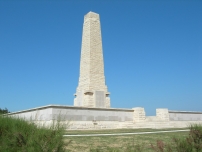| First Name: | Thomas | Last Name: | JENNINGS | |
|---|---|---|---|---|
| Date of Death: | 04/06/1915 | Lived/Born In: | Marylebone | |
| Rank: | Private | Unit: | Royal Dublin Fusiliers1 | |
| Memorial Site: | Helles Memorial, Gallipoli | |||
Current Information:
Age-28 Enlisted-London
Gallipoli 1915 On 25 April, British, Australian and New Zealand forces landed on the Gallipoli peninsular hoping for a quick campaign that would knock Turkey out of the war.But it was not to be. The Turks fought bravely, the terrain was a maze of ravines and very soon the stalemate of trench warfare had set in. Add to this the summer heat, water shortages, dead bodies lying around and millions of flies and the place took on nightmarish proportions. By January 1916, all British, French,Indian, Australian and New Zealand forces had left Gallipoli, leaving only behind the dead, over 56,000 of them. First World War generals and commanders did not emerge from the conflict with their reputations untarnished and although in many cases this was undeserved this was certainly not the case with Major -General Hunter-Weston when he commanded the 29th Division in Gallipoli and this was no more evident than with his handling of the three Battles of Krithia. He lacked imagination, had little regard for casualty figures and had no alternative plans to the frontal assault he favoured so much and which inevitably came to grief at great human cost. The overall commander General Hamilton should of course have intervened but he was too much of a gentleman for ‘caddish’ behaviour such as questioning another General’s tactics, so thousands of men needlessly died. Third Battle of Krithia 4th June, 1915 Like the previous two battles, this one also failed in its objectives. Some land was gained, but nothing of any significance, and there were 6,500 more British and French casualties. The 1st Royal Dublin Fusiliers battalion of 86 Brigade, 29th Division, were not directly involved in this fight but the beach head held by the Allies at Helles was small and there was little room, if any, to escape Turkish shelling and it is more than likely that it was this that killed Thomas Jennings. |
||||
| « Back to Search Results | ||||
| If you think any of the information shown here is incorrect, Click Here to submit your amends and comments | ||||




